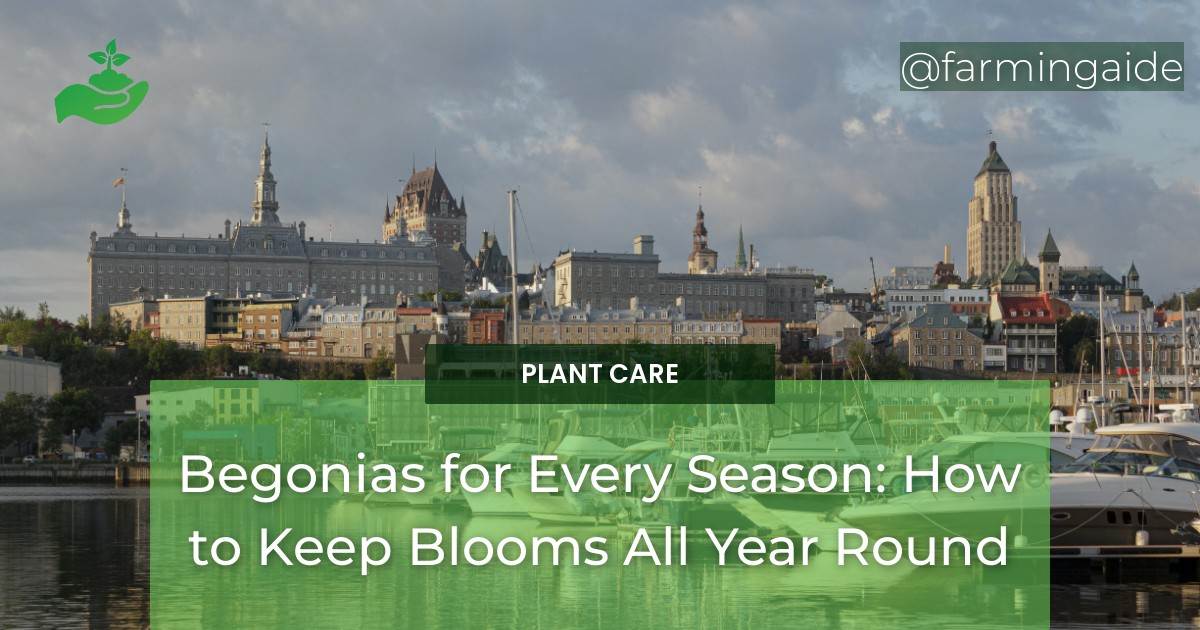Begonias are a popular choice for gardeners looking to add color and beauty to their outdoor spaces. With their vibrant blooms and variety of sizes and shapes, these plants are a great addition to any garden. However, many people may not realize that begonias can be enjoyed all year round, not just in the spring and summer. In this comprehensive article, we will explore the best begonia varieties for each season, as well as tips for overwintering begonias to ensure year-round blooms in your garden. So let’s dive in and discover the world of year-round begonias!
Best Begonia Varieties for Each Season
Spring Begonias
Spring is the perfect time to start planting begonias, as the weather begins to warm up and the threat of frost has passed. Some of the best begonia varieties for spring include:
- Rex begonias
- Tuberous begonias
- Dragon wing begonias
When planting spring begonias, it’s important to choose a location with well-draining soil and partial shade. These plants prefer moist, but not soggy, soil and can benefit from a layer of mulch to retain moisture. Regular watering and fertilizing can help promote healthy growth and vibrant blooms.
Summer Begonias
As the temperatures rise, it’s important to choose begonia varieties that can withstand the heat and humidity of summer. Some recommended varieties for summer include:
- Wax begonias
- Fibrous begonias
- Cane begonias
To maintain healthy summer begonias, make sure to water regularly and provide some shade during the hottest part of the day. Deadheading spent blooms can also help encourage new growth and prolong the blooming period.
ALSO READ
Fall Begonias
Just because summer is coming to an end, doesn’t mean your garden has to lose its color. Fall-blooming begonias are a great way to add some late-season interest to your garden. Some popular fall begonias include:
- Tuberous begonias
- Rex begonias
- Fibrous begonias
When growing fall begonias, it’s important to consider factors such as temperature and light. These plants prefer cooler temperatures and can benefit from some shade during the hottest part of the day. They also require well-draining soil to prevent root rot.
Winter Begonias
Believe it or not, there are begonia varieties that can thrive in the winter months. Some hardy begonias that can withstand cold temperatures include:
- Winter-flowering begonias
- Hardy begonias
- Tuberous begonias
When growing winter begonias, it’s important to protect them from harsh winter weather. This can include covering them with a layer of mulch or moving them to a sheltered location. Regular watering and fertilizing can also help promote healthy growth during the winter months.
Tips for Overwintering Begonias
ALSO READ
Understanding Overwintering
Overwintering is the process of protecting plants from harsh winter weather by moving them to a sheltered location or providing them with extra care. This is especially important for begonias, as many varieties cannot survive freezing temperatures.
Overwintering begonias is important because it allows you to enjoy these plants year-round and ensures that they will continue to thrive in your garden for years to come.
Preparing Begonias for Overwintering
Before the first frost hits, it’s important to prepare your begonias for overwintering. This can include:
- Trimming back any dead or damaged foliage
- Repotting if necessary
- Removing any pests or diseases
It’s also important to avoid overwatering your begonias before overwintering, as this can lead to root rot.
Choosing the Right Location
The ideal location for overwintering begonias is a cool, dark place with temperatures between 45-55 degrees Fahrenheit. This can include a basement, garage, or even a closet. It’s important to avoid locations with extreme temperature fluctuations or direct sunlight.
When selecting a location for overwintering, also consider factors such as humidity and air circulation. Begonias prefer a slightly humid environment, so you may need to mist them occasionally. Good air circulation can also help prevent the growth of mold or mildew.
Caring for Begonias During Winter
During the winter months, it’s important to continue caring for your begonias to ensure they stay healthy and ready for spring. Some tips for caring for begonias during winter include:
- Watering sparingly, as overwatering can lead to root rot
- Providing some light, but avoiding direct sunlight
- Monitoring for pests and diseases
It’s also important to avoid fertilizing your begonias during winter, as they are in a dormant state and do not require additional nutrients.
Bringing Begonias Out of Dormancy
As the weather begins to warm up and the threat of frost has passed, it’s time to bring your begonias out of dormancy. This process should be done gradually to avoid shock to the plants. Some steps to take when bringing begonias out of dormancy include:
- Gradually increasing light exposure
- Gradually increasing watering
- Repotting if necessary
With proper care, your begonias will come out of dormancy and begin to grow and bloom once again.
How Can I Keep My Begonias Blooming All Year Round as a Beginner Grower?
If you’re a beginner grower looking to keep your begonias blooming all year round, the key is to provide the right care. Make sure to place them in a location with bright, indirect sunlight and keep the soil consistently moist. This beginner’s guide to begonias will help you achieve beautiful blooms continuously.
Conclusion
Begonias are a versatile and beautiful addition to any garden, and with the right care, they can provide year-round blooms. By choosing the best begonia varieties for each season and properly overwintering them, you can enjoy these plants in your garden all year long. Remember to provide the necessary care and attention to your begonias, and they will reward you with their vibrant colors and blooms for years to come.


